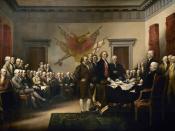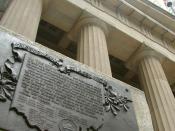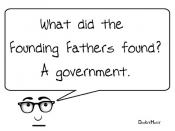William W. Freehling presents his view of the Founding Fathers and slavery in the article 'The Founding Fathers and Slavery.' He contends that America's Founding Fathers were antislavery but gives viewpoints of other historians to the contrary. The first sentence of the article states, 'Only a few years ago... no man needed to defend the Founding Fathers on slavery.' This implies that there was a change in the interpretation of the Founding Fathers position on slavery and indeed there was. Freehling lists the men who hold this more recent opinion, he says, 'Scholars such as Robert McColley, Staughton Lynd, William Cohen, and Winthrop Jordan have assaulted every aspect of the old interpretation.' The more recent opinion that the Founding Fathers were not antislavery is supported by the notion that the Declaration of Independence was a white man's document and was not intended for the freedom of slaves. The fact that Thomas Jefferson bought and sold slaves and 'ordered lashes well laid on' also supports the newer viewpoint.
The founding fathers are defended by Freehling however. He says, 'The impact of the Founding Fathers on slavery... must be seen in the long run not in terms of what changed in the late eighteenth century but in terms of how the Revolutionary experience changed the whole of American antebellum history. Any such view must place Thomas Jefferson and his contemporaries... back into the creeping American antislavery process.'
The Founding Fathers ran into a dillema when it came to slavery. Their ideology of freedom and the right to own property conflicted with the freedom of the slaves. Freehling says, 'On the one hand they were restrained by their overriding interest in creating the Union, by their concern for property rights, and by their visions of race war and miscegenation: on the other hand...


